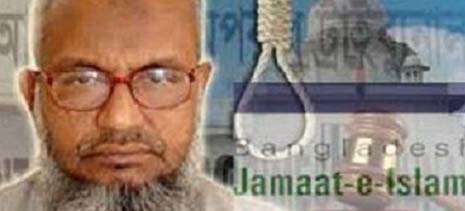Analyzing conflict and subsequent division that occurred between Pakistan and Bangladesh would help to better understand the backdrop of this execution. Ethnic conflicts were fomented owing to centuries old British colonial policy in the region. Starting from XVIII-XIX centuries, the very policy leading to division of India into two separate states – Pakistan and India, and establishment of the state of Bangladesh in the Eastern Pakistan in the wake of Indian occupation in 1971, paved the way for emergence of strife on ethnic and religious grounds.
International War Crimes Court, set up by the Bangladeshi government for the purpose of investigating crimes committed during the independence struggle against Pakistan in 1971, sentenced Mullah to life imprisonment on February 5, 2013. Subsequent appeal with the Constitutional Court, made on 17 September, was upheld and Mullah was sentenced to death. This particular decision was regarded as a paradox from the international law point of view because the Constitutional Court can only reduce the prison sentence or rescind the verdict. However, Bangladesh’s Constitutional Court substituted life imprisonment with the death sentence, thus defying international law.
It occurred despite that Abdul Kader Mullah, along with being against separation of Bangladesh from Pakistan in 1971, fiercely condemned atrocities committed then by the former against the Bengals. Back then, intellectuals and religious leaders on both sides opposed the division. Eminent Pakistani thinker Maududi was among those because he believed secession would entail problems. Today’s reality is a testimony to that. Bangladesh suffers grave political and economic crisis. The execution verdict reached 42 later and its hasty implementation implies something else.
Political and economic backdrop of the execution
Execution of Abdul Kader Mullah is directly linked with the upcoming January elections in Bangladesh – an election expected to amass votes under the theme of Bengali patriotism. And since Abdul Kader Mullah was largely seen as a political challenger to the incumbent Prime Minister Sheikh Hasina he thus, constituted a problem.
As mentioned above, Bangladesh faces great economic difficulties. On the other hand, violence in Myanmar, formerly known as Burma, was committed under the banner of Buddhism. Muslims inhabiting those areas were expelled from their native lands. Some found shelter in Bangladesh. Camouflaging the conflict as Muslim-Buddhist strife has to be seen in the context of oil and gas pipelines to be built from Myanmar to China. Similar to other parts of the world, the issues of "energy security" and "security corridor" come into agenda. Therefore, Muslims inhabiting the areas along the future pipeline routes are being forced to flee because they are seen as potential future threat to regional energy security.
Muslims have generally been oppressed in Bangladesh in recent years. Resembling other Muslim countries of the world, global powers wage here a "Muslim manhunt” under the "Al-Qaeda" pretext. In this sense, many devout Muslims and groups affiliated with Islam are being maligned as terrorists and subjected to extermination. Therefore, Mullah’s execution is a verdict beyond Bangladesh-Pakistan conflict. It’s an integral part of the genocide policy pursued against the Muslims in the country.
It must be stressed that despite the stay appeal issued by the UN Secretary General, Bangladeshi authorities nevertheless went forward with it. Turkey’s Prime Minister also urged his Bangladeshi counterpart to withhold the execution and described it as a black stain for Bangladesh, should it be implemented.
According to some experts, present developments in Bangladesh can provoke a civil war akin of Syria’s. Thus, it is imperative that the authorities position themselves correctly. Otherwise, the "Islamic threat"-centered security strategy of the great powers is going to whelm yet another nation.
Dr. Rashad Ilyasov
More about:
















































